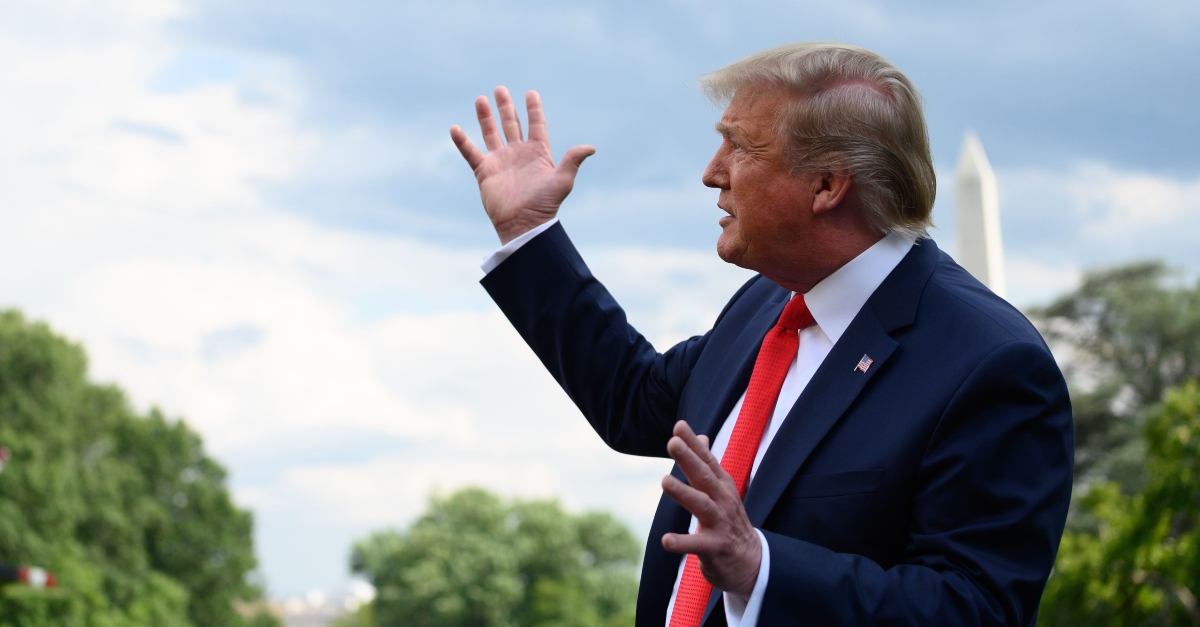
The Trump White House on Tuesday responded to the U.S. House of Representative’s informal impeachment inquiry with an eight-page letter decrying the entire process as “constitutionally illegitimate.”
“Given that your inquiry lacks any legitimate constitutional foundation, any pretense of fairness, or even the most elementary due process protections, the Executive Branch cannot be expected to participate in it,” White House Counsel Pat Cipollone‘s letter notes.
That rhetorical bluster continues:
Because participating in this inquiry under the current unconstitutional posture would inflict lasting institutional harm on the Executive Branch and lasting damage to the separation of powers, you have left the President no choice. Consistent with the duties of the President of the United States, and in particular his obligation to preserve the rights of future occupants of his office, President Trump cannot permit his Administration to participate in this partisan inquiry under these circumstances.
Initial reaction to the single-spaced series of arguments treated Cipollone’s words like a missive bereft of legal argumentation.
“Wow. This letter is bananas,” tweeted former Department of Justice counsel and current Republican Party strategist Gregg Nunziata. “A barely-lawyered temper tantrum. A middle finger to Congress and its oversight responsibilities. No Member of Congress should accept it, no matter his or her view on the behavior of Pelosi, Schiff, or Trump. Things are bad. Things will get worse.”
UC Berkeley Law Professor Orin Kerr responded to the news by posting the third article of impeachment filed by the House against then-president Richard Nixon in 1974.
That article alleged Nixon “failed without lawful cause or excuse to produce papers and things as directed by duly authorized subpoenas issued by the Committee on the Judiciary of the House of Representatives.” Later on the article clarifies why that’s important:
The subpoenaed papers and things were deemed necessary by the Committee in order to resolve by direct evidence fundamental, factual questions relating to Presidential direction, knowledge or approval of actions demonstrated by other evidence to be substantial grounds for impeachment of the President. In refusing to produce these papers and things Richard M. Nixon, substituting his judgment as to what materials were necessary for the inquiry, interposed the powers of the Presidency against the the lawful subpoenas of the House of Representatives, thereby assuming to himself functions and judgments necessary to the exercise of the sole power of impeachment vested by the Constitution in the House of Representatives.
And, without putting too fine a point on it, Kerr later followed up by claiming that America is “now” in “a constitutional crisis.”
The White House letter frequently reads like a political document–and the repetitious, sweeping dismissals of congressional investigative authority are not likely to sit well with Democratic legislators in the House. There are, however, some arguments contained in the sprawling broadside against impeachment.
Notably, the House has not initiated formal impeachment proceedings. Law&Crime previously explained the upshot of this detail when Speaker of the House Nancy Pelosi (D-Calif.) announced an impeachment inquiry without convening a separate committee on impeachment.
Of course, the Constitution doesn’t actually require any sort of formal proceedings for impeachment until the eventual vote comes. But count Cipollone and the White House as wholly unmoved by the strictures of the U.S. Constitution. Their letter argues that “all past bipartisan precedent[s]” on impeachment are being violated.
And, in a sense, that’s true.
CNN legal analyst, attorney and impeachment expert Ross Garber explained via email:
This letter is clearly written for the President’s base. But there are also outlines of an argument that might also appeal to those who might be persuadable: that the process isn’t a fair and thorough way to get at the truth. The White House Counsel is right that previous House presidential impeachment processes have given the president and minority party rights to participate. In both Nixon and Clinton, the President had the right to attend all hearings, present evidence, and cross-examine witnesses. In both of those impeachments, the minority and majority parties cooperated on issuing subpoenas.
As Law&Crime is accustomed to reminding our readers: impeachment might look quite legalistic–but it’s only legal-ish in appearance. The entire process is protected by and imbued with the power of the U.S. Constitution. As such, the House’s conduct–and ultimate conclusions–are entirely fair game.
The ultimate decision in the House of Representatives is theirs and theirs alone. Just like the White House’s decision to comply or not to comply with the House’s Constitutionally-granted authority.
[image via via ROBERTO SCHMIDT_AFP_Getty Images]
Have a tip we should know? [email protected]